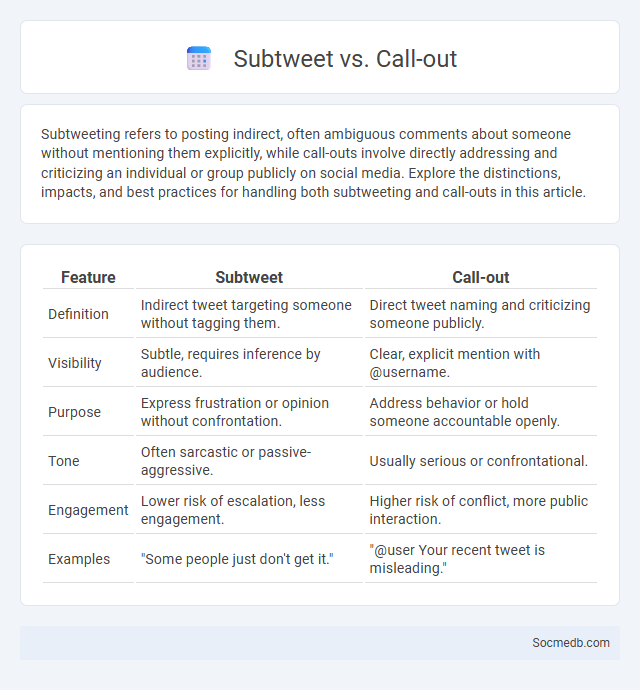
Photo illustration: Subtweet vs Call-out
Subtweeting refers to posting indirect, often ambiguous comments about someone without mentioning them explicitly, while call-outs involve directly addressing and criticizing an individual or group publicly on social media. Explore the distinctions, impacts, and best practices for handling both subtweeting and call-outs in this article.
Table of Comparison
| Feature | Subtweet | Call-out |
|---|---|---|
| Definition | Indirect tweet targeting someone without tagging them. | Direct tweet naming and criticizing someone publicly. |
| Visibility | Subtle, requires inference by audience. | Clear, explicit mention with @username. |
| Purpose | Express frustration or opinion without confrontation. | Address behavior or hold someone accountable openly. |
| Tone | Often sarcastic or passive-aggressive. | Usually serious or confrontational. |
| Engagement | Lower risk of escalation, less engagement. | Higher risk of conflict, more public interaction. |
| Examples | "Some people just don't get it." | "@user Your recent tweet is misleading." |
Introduction to Subtweeting and Call-Outs
Subtweeting involves posting indirect or implied comments about someone on social media, often without naming them explicitly, while call-outs directly address or criticize a person or group. Understanding the nuances between subtweeting and call-outs helps you navigate online conversations and manage social dynamics more effectively. Both practices can influence your digital reputation and interactions within your social network.
Defining Subtweet: Meaning and Usage
A subtweet is a social media post that indirectly refers to or criticizes someone without mentioning their username, often used to express frustration or commentary anonymously. This subtle communication tactic allows users to address conflicts or opinions while avoiding direct confrontation, commonly seen on platforms like Twitter. Understanding subtweets helps decode nuanced online interactions and the underlying social dynamics they reveal.
What is a Call-Out? Characteristics and Examples
A call-out in social media is a direct mention or critique of someone's behavior, often highlighting an issue or calling attention to problematic actions. Characteristics include clear identification of the subject, concise language, and an intent to hold the person or entity accountable publicly. Your effective call-out can raise awareness, prompt dialogue, and encourage accountability within online communities.
Subtweet vs Call-Out: Key Differences
Subtweeting involves indirect references or veiled criticisms of a person without naming them, creating ambiguity and often sparking curiosity or speculation among followers. Call-outs directly address and criticize individuals or groups by name, aiming for public accountability and transparency on social media platforms like Twitter and Instagram. Understanding the distinction between subtweets and call-outs is essential for navigating online discourse and managing digital reputations effectively.
Why People Subtweet: Motivations and Impacts
People subtweet to express opinions or emotions indirectly, avoiding direct confrontation while still addressing specific individuals or situations. This behavior allows you to share thoughts anonymously, preserving social harmony or personal privacy while signaling discontent or criticism. Subtweeting can impact relationships by creating ambiguity and misunderstandings, influencing social dynamics both online and offline.
The Effects of Call-Out Culture Online
Call-out culture online amplifies social accountability by publicly criticizing individuals or organizations for perceived wrongdoings, often accelerating social justice movements. However, it can lead to increased polarization and mental health challenges due to mob mentality and lack of due process. Platforms like Twitter and Instagram play a pivotal role in both spreading awareness and intensifying the backlash inherent in call-out culture.
Ethical Considerations: Privacy and Public Shaming
Social media platforms raise critical ethical concerns regarding user privacy, as personal information is often collected, shared, and exploited without explicit consent. Public shaming on these platforms can lead to severe psychological harm and social consequences, disproportionately affecting marginalized groups. Implementing stricter privacy controls and promoting respectful online behavior are essential steps to mitigate these ethical risks.
When Should You Subtweet or Call-Out?
Subtweeting or calling out on social media is effective when addressing a situation indirectly to avoid direct confrontation while still expressing your perspective. You should consider subtweeting when the issue involves sensitive topics, unclear details, or when you want to protect the privacy of those involved. Calling out is more appropriate when highlighting harmful behavior, promoting accountability, or demanding change in a public, transparent manner.
The Role of Social Media Platforms
Social media platforms serve as critical hubs for real-time communication, content sharing, and community building, enabling billions of users to connect globally. They drive digital marketing strategies by providing targeted advertising tools, user analytics, and influencer collaborations that enhance brand visibility and consumer engagement. These platforms also shape public opinion and cultural trends through viral content dissemination and interactive features like comments, live streams, and polls.
Conclusion: Navigating Digital Communication
Mastering digital communication requires understanding platform algorithms, privacy settings, and audience engagement to enhance your online presence. Effective social media use involves crafting clear, authentic messages that resonate with diverse audiences while maintaining digital etiquette. You can build meaningful connections and avoid misunderstandings by navigating these elements strategically.
 socmedb.com
socmedb.com